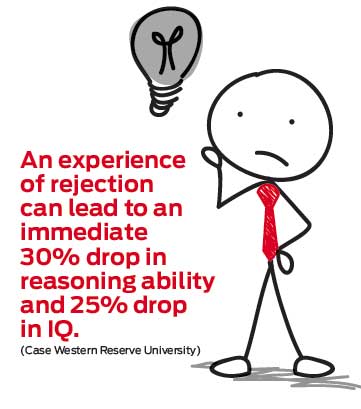Strategy May 03, 2017
How To Accept Rejection
The human brain is hardwired to avoid rejection, and reps who succumb to the fear can damage their career. But with a change in thinking, it's possible to cast aside the 'No' to make the sale.
 s a young saleswoman, Michelle Parisi was eager and optimistic, not yet jaded by cranky prospects and their snippy brush-offs. And her enthusiasm was serving her well as she worked her way up in the competitive world of advertising sales.
s a young saleswoman, Michelle Parisi was eager and optimistic, not yet jaded by cranky prospects and their snippy brush-offs. And her enthusiasm was serving her well as she worked her way up in the competitive world of advertising sales.
>>Don't miss! 8 ways to handle refusals
After one appointment on behalf of a Philadelphia-area radio station, she was on her way back to the office when she spotted a boat sales company. Thinking that Irv Homer, the station’s most popular on-air personality at the time and an avid boater, would be a great endorser for the store, she stopped in to gauge their interest.

Quietly and politely, Parisi waited while the woman at the counter finished up with a customer. When she finally turned to Parisi and asked what she wanted, the young executive began her pitch. But she didn’t get far.
“She quickly cut me off, telling me harshly that they weren’t interested, they didn’t allow soliciting and I should leave,” says Parisi. “I apologized and left.”
Today, Parisi has 25 years of sales experience under her belt, and is also the principal at Core Strength Strategies, a coaching consultancy for businesswomen. While she certainly didn’t let this caustic rejection derail her career, the sting hasn’t gone away completely.
“Initially, I was very shaken and upset,” she says. “I was embarrassed that she had talked to me that way in front of another customer. But then, I told myself Irv would have done a great job for them, so it was their loss.”

Avoiding rejection is an essential part of our psychological mindset. And yet, dealing with the consequences of rejection is part of the job for salespeople. If the fear of it becomes overwhelming, it can result in a slow-down in prospecting, fewer closed sales and missed quotas. It can hurt your career. It doesn’t have to.
“Rejection is not pleasant, but it’s not the end of the world,” says Parisi. “You’re no worse off than before. Those 15 minutes taught me a lot about the value of being kind and keeping it in perspective.”
The Pressure to Please
The human distaste for rejection is so strong that it influences many of the daily decisions people make. “We don’t join a conversation in the breakroom or speak up at a meeting,” says Amy Morin, a psychotherapist and author of 13 Things Mentally Strong People Don’t Do. “Maybe we don’t choose a certain color shirt that morning. Some people don’t care, and can recount all their failures with a smile. But for most of us, the fear comes from our goal of pleasing people.”
 This constant effort to appease stems from a perpetual concern with social acceptance. Take going to the grocery store, for example. “You don’t take your shirt off, or run around screaming, or push your cart into people,” says Dr. Mark Leary, professor of psychology and neuroscience at Duke University. “We’re programmed to always be aware of how we’re being accepted.”
This constant effort to appease stems from a perpetual concern with social acceptance. Take going to the grocery store, for example. “You don’t take your shirt off, or run around screaming, or push your cart into people,” says Dr. Mark Leary, professor of psychology and neuroscience at Duke University. “We’re programmed to always be aware of how we’re being accepted.”
In fact, the concern over peer approval has been part of human psychology for millennia. Leary explains that it has its root in prehistoric times, when early peoples lived in nomadic bands. Remaining on good terms with the others was a matter of life and death, since it was impossible to survive alone.
Today, rejection is unpleasant but (most often) survivable; still, people are hardwired to avoid it. This happens subconsciously all throughout the day. “It takes just one smirk or strange look,” says Leary. “Alarm bells go off, our antennae go up. It has a pervasive impact on our behavior and it’s always in the background. A lot of the time, it doesn’t really matter, but back in early times, it did. So we tend to err in the direction of overreacting.”
While some take rejection (or what’s perceived to be a snub) in stride, others react with varying degrees of sadness, hurt, embarrassment and anger. Often, the fear of being socially shunned originates from a deep sense of inadequacy, resulting in a tidal wave of emotions.

For most people, beginning at a very early age, those around them give them messages regarding their identity and how others perceive them, says psychotherapist and executive coach Andrew Snyder. What is relayed, particularly the negative, continues to create insecurities. “Rejection touches on wounds we’ve been given, especially feelings of inferiority,” he says. “It shakes our confidence and sometimes reopens those wounds. You have doubts about yourself, and if someone touches on that, it can be very painful.”
And that’s why the answer “We’re not interested” to a carefully crafted sales pitch can be so hard to hear. To the all-important question, “Do I personally have what it takes to make this sale?”, the prospect has just responded with a resounding “No.” It then becomes challenging to muster the energy needed to counter the refusal, while a series of unsuccessful calls makes it increasingly difficult to continue prospecting.
 Salespeople craft a persona to give them the confidence to win the sale – but a rejection can crack that persona. “When you put yourself out there, the question of ‘Who am I?’ is answered,” says Morin. “It shakes up our beliefs about ourselves. We cover up the hurt with anger and say, ‘I just won’t try anymore.’”
Salespeople craft a persona to give them the confidence to win the sale – but a rejection can crack that persona. “When you put yourself out there, the question of ‘Who am I?’ is answered,” says Morin. “It shakes up our beliefs about ourselves. We cover up the hurt with anger and say, ‘I just won’t try anymore.’”
In sales, it’s called “call reluctance,” and it’s a self-defeating cycle. The good news is that it can be overcome. Instead of allowing rejection to become a personal threat, reframe it, says Snyder. “Look at a no as ‘not a fit.’ In sales, it means your product was just not a good fit for that buyer. Reframing allows us to recognize that the way someone treats us is not a verdict on our value as people.”
Though the incident at the boat dealer has stayed with her over the years, Parisi was able to quickly reframe the situation and concentrate on more promising prospects. “They probably wouldn’t have made for a good client to work with anyway,” she says. “So I moved on.”
Alternative Approaches
Think you’re the only one who’s heard “no” from a prospect? Think again. These distributors have all faced down rejection and moved past it to make the sale.
 Amanda Dudek, owner of A Dudek Promotions (asi/101207)
Amanda Dudek, owner of A Dudek Promotions (asi/101207)
“I recently called a prospect to discuss my company’s offerings. We had a rocky start when the prospect said, ‘We don’t want to buy anything right now.’ I was immediately taken back. I had never received this type of response, but I reiterated that I was not proposing a hard sell, and after a few questions, I was able to identify their needs and pain points. I positioned our value proposition and unique differentiators in a more favorable light, and we now have a great business relationship that continues to pay dividends. Often a hard no is really just a soft yes in disguise.”
 Vicki Clayman, president of Partners N Promotion Inc. (asi/350153) and Brilliant Impressions LLC
Vicki Clayman, president of Partners N Promotion Inc. (asi/350153) and Brilliant Impressions LLC
“There was a new buyer at an account I had been calling on for three or four years, and for whatever reason she did not like me at all. She would not return calls or schedule any appointments. I eventually thought about her personality and then told one of my colleagues she should call on this woman, because they might have a connection. I preferred the company I was working for to keep the account than lose it altogether. It worked!”
 Matt Gledhill, vice president of sales and marketing at Walker Advertising (asi/354440)
Matt Gledhill, vice president of sales and marketing at Walker Advertising (asi/354440)
“If I haven’t received a response after leaving multiple messages and emails, I’ll send a handwritten note expressing the heartfelt passion I have for taking their goals and making them mine and expanding them more than they can imagine. I wouldn’t use this tactic for just any company. But is the juice worth the squeeze? If it is, then why not?”
Sara Lavenduski is the senior editor for Advantages. Tweet: @SaraLav_ASI. Contact: slavenduski@asicentral.com
